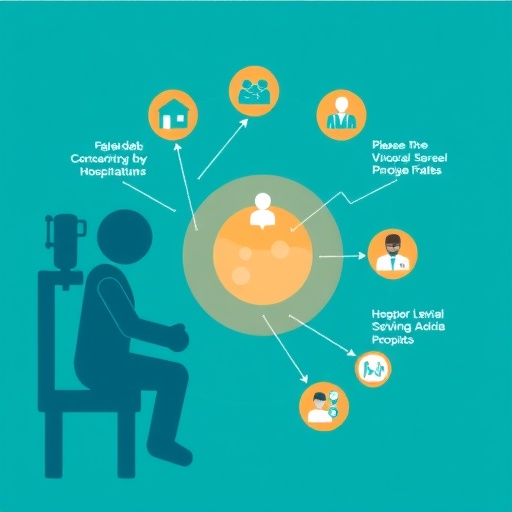
In recent strides within diabetes management, a pivotal study has illuminated the implications of hospitalization patterns stemming from the Phase 3a ONWARDS trials involving Once-Weekly Insulin Icodec. This groundbreaking research, led by Philis-Tsimikas et al., emphasizes the critical intersection of innovative diabetes treatments and healthcare utilization, providing vital insights for both clinicians and patients alike. As the prevalence of diabetes continues to accelerate globally, the need for effective insulins that not only enhance glycemic control but also minimize adverse outcomes like hospital readmission becomes increasingly paramount.
The ONWARDS trials were meticulously designed to evaluate the efficacy and safety of Once-Weekly Insulin Icodec, a transformative approach in insulin delivery. Traditional insulin regimens often require daily injections, presenting barriers to adherence for many patients. In stark contrast, Insulin Icodec aims to simplify treatment by allowing for once-weekly administration, theoretically improving adherence and long-term glycemic management. Through this new methodology, the ONWARDS trials sought to explore not only the pharmacological benefits but also how such novel therapies may reshape the landscape of diabetes-related hospitalizations.
Throughout the trials, researchers monitored hospitalization rates across a diverse cohort of participants, aiming to ascertain whether the switch to Insulin Icodec would lead to decreased rates of hospital admissions. The findings were profound. A substantial reduction in hospitalizations for diabetes-related complications was observed among those treated with Insulin Icodec compared to traditional insulin therapies. Such results elucidate the potential of this innovative insulin formulation not only in enhancing blood sugar control but also in reducing the broader socioeconomic burden posed by the disease.
The trials highlighted various complications that historically necessitate hospital care, including severe hypoglycemia and diabetes-related acute metabolic crises. It was noteworthy that the instances of such hospitalizations diminished significantly in the Insulin Icodec group. This statistic is critical as it not only speaks to the efficacy of the medication but also serves as a beacon of hope for individuals living with diabetes, who often grapple with the fear of hospitalization due to their condition.
Complications from diabetes can escalate rapidly, leading to life-threatening scenarios and extensive healthcare costs. By demonstrating that Insulin Icodec can mitigate these risks, the ONWARDS trials provide a compelling case for healthcare providers to consider adopting this therapy as a first-line treatment. The implications of adopting Once-Weekly Insulin Icodec could be far-reaching, transforming not only individual patient care but also systemic healthcare practices aimed at diabetes management.
Patient feedback was integral to the trials, shedding light on the real-world implications of switching therapies. Many patients reported feeling more empowered and less anxious about managing their condition with a once-weekly injection schedule. This mental health aspect cannot be overlooked; chronic conditions like diabetes often carry a psychological burden alongside physical health challenges. Providing patients with easier management options may contribute positively to their overall well-being.
Furthermore, the economic ramifications of such a shift in treatment paradigms warrant exploration. With decreasing hospitalization rates comes a reduction in healthcare costs, both for patients and the healthcare system at large. This aspect could encourage wider adoption and support from payers and policymakers alike, fostering a more sustainable model for diabetes care centered around prevention rather than reactive hospitalization.
In considering the broader public health perspective, the ONWARDS trials may herald a new era in diabetes management, one that prioritizes patient-centered approaches and systemic efficiency. As healthcare systems grapple with the increasing prevalence of chronic diseases, embracing innovative therapies like Insulin Icodec becomes essential. The research encapsulates an urgent need to re-evaluate traditional diabetes treatment protocols that fail to account for modern patient lifestyles.
It is also essential to recognize the necessity for ongoing research beyond the ONWARDS trials. While the initial findings are promising, further studies are needed to establish long-term safety profiles and understand the full spectrum of patient outcomes associated with Insulin Icodec. The landscape of diabetes care is ever-evolving, with emerging therapies and technologies poised to reshape treatment protocols fundamentally.
Community and stakeholder engagement is paramount as these new therapies are integrated into clinical practice. Educational forums that facilitate discussions between healthcare providers and patients can enhance understanding and acceptance of once-weekly insulins. Such initiatives can ultimately drive improvements in adherence, health outcomes, and patient satisfaction.
In conclusion, the insights gleaned from the ONWARDS trials offer a compelling narrative about the future of diabetes management. Once-Weekly Insulin Icodec stands as a testament to the progress being made in the field, illuminating pathways toward safer, more effective treatments. As these results advocate for a paradigm shift in how diabetes is managed, they simultaneously underscore the importance of continued innovation and research in pursuit of optimal patient care.
With diabetes on the rise and its associated healthcare challenges, it is crucial to remain vigilant and proactive. Innovations like Insulin Icodec not only represent advancements in treatment efficacy but also the potential for significant improvements in the quality of life for a myriad of individuals affected by diabetes. Embracing this change is not just about managing blood sugar; it is also about paving the way for healthier futures devoid of unnecessary complications.
Understanding the implications of this research will pave the way for enhanced treatment strategies, ultimately benefitting patients, healthcare providers, and the broader community. As we forge ahead, fostering a culture that embraces change and innovation will be vital in overcoming the challenges posed by diabetes and enhancing healthcare outcomes.
Ultimately, the findings from the ONWARDS trials highlight the new era of insulin therapy, advancing our collective goal of improving lives for those combating diabetes daily. With every new approach, we take a step forward on the path to curtailing the diabetes epidemic and improving overall public health.
Subject of Research: Hospitalization insights from the Phase 3a ONWARDS trials of Once-Weekly Insulin Icodec.
Article Title: Insights on Hospitalisations from the Phase 3a ONWARDS 1–6 Trials of Once-Weekly Insulin Icodec.
Article References:
Philis-Tsimikas, A., Krogsdahl Bache, J., Fu, A. et al. Insights on Hospitalisations from the Phase 3a ONWARDS 1–6 Trials of Once-Weekly Insulin Icodec. Diabetes Ther 16, 1615–1631 (2025). https://doi.org/10.1007/s13300-025-01745-4
Image Credits: AI Generated
DOI: https://doi.org/10.1007/s13300-025-01745-4
Keywords: Diabetes, Insulin Icodec, Hospitalizations, Clinical Trials, Healthcare Innovation.
Tags: diabetes management advancementsefficacy and safety of Insulin Icodecglycemic control and hospital readmissionhealthcare utilization in diabeteshospitalization patterns in diabetesinnovative diabetes treatmentsinsulin delivery methodsOnce-Weekly Insulin Icodecpatient adherence to insulin therapyPhase 3a ONWARDS trialsreducing diabetes-related hospitalizationstransformative diabetes therapies




